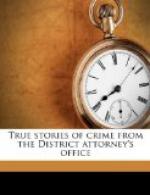Yet who was the greater criminal—the weak, ignorant, poverty-stricken clerk, or the shrewd, experienced lawyer who preyed upon his client and through him upon the community at large?
The confession of Miller, in the face of what the consequences of his course might mean to his wife and child, was an act of moral courage. The price he had to pay is known to himself alone. But the horrors of life in prison for the “squealer” were thoroughly familiar to him when he elected to do what he could to atone for his crime. In fact Ammon had not neglected to picture them vividly to him and to stigmatize an erstwhile client of his.
“Everything looks good,” he wrote to Miller in Sing Sing, in reporting the affirmance of Goslin’s conviction, “especially since the squealer is getting his just deserts.”
With no certain knowledge of a future pardon Miller went back to prison cheerfully to face all the nameless tortures inflicted upon those who help the State—the absolute black silence of convict excommunication, the blows and kicks inflicted without opportunity for retaliation or complaint, the hostility of guards and keepers, the suffering of abject poverty, keener in a prison house than on any other foot of earth.
It is interesting to observe that Miller’s original purpose had been to secure money to speculate with—for he had been bitten deep by the tarantula of Wall Street, and his early experiences had led him to believe that he could beat the market if only he had sufficient margin. This margin he set out to secure. Then when he saw how easy it was to get money for the asking, he dropped the idea of speculation and simply became a banker. He did make one bona-fide attempt, but the stock went down, he sold out and netted a small loss. Had Miller actually continued to speculate it is doubtful whether he could have been convicted for any crime, since it was for that purpose that the money was entrusted to him. He might have lost it all in the Street and gone scot free. As it was, in failing to gamble with it, he became guilty of embezzlement.
Ammon arrived in Sing Sing with a degree of eclat. He found numerous old friends and clients among the inmates. He brought a social position which had its value. Money, too, is no less desirable there than elsewhere, and Ammon had plenty of it.
In due course, but not until he had served more than half his sentence (less commutation), Miller a broken man, received his pardon, and went back to his wife and child. When Governor Higgins performed this act of executive clemency, many honest folk in Brooklyn and elsewhere loudly expressed their indignation. District Attorney Jerome did not escape their blame. Was this contemptible thief, this meanest of all mean swindlers, who had stolen hundreds of thousands to be turned loose on the community before he had served half his sentence? It was an outrage! A disgrace to civilization! Reader, how say you?




